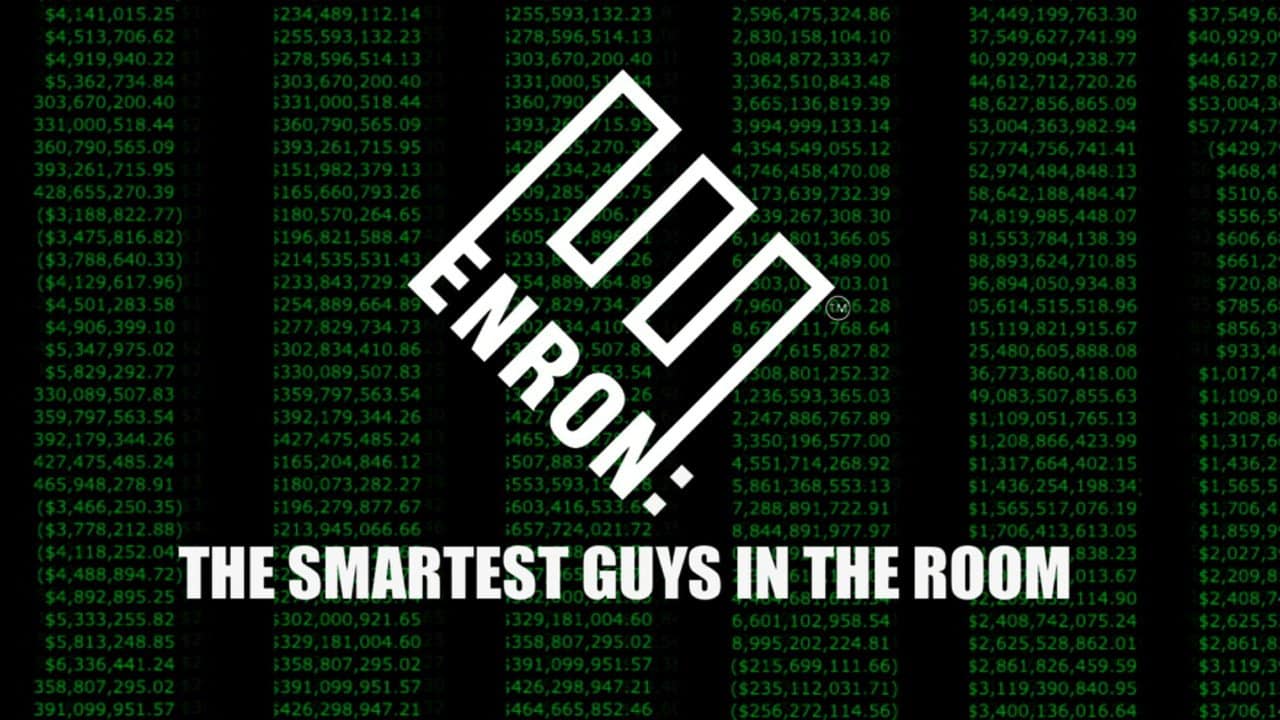
ENRON: THE SMARTEST GUYS IN THE ROOM explores the fall of the Enron Corporation, arguably the most shocking example of modern corporate corruption.
The film is a concise, entertaining documentary about the spectacular failure of Enron. The Seattle Times said "Gibney's documentary is ultimately not about business and numbers but about morality how a group of people, blinded by money, lost their souls." While the LA Times said "It's a chilling, completely fascinating documentary that reveals the face of unregulated greed in a way that's every bit as terrifying as Lon Chaney's unmasking in The Phantom of the Opera. Enron dives from the seventh largest US company to bankruptcy in less than a year in this tale told chronologically. The emphasis is on human drama, from suicide to 20,000 people sacked: the personalities of Ken Lay (with Falwellesque rectitude), Jeff Skilling (he of big ideas), Lou Pai (gone with 250 M), and Andy Fastow (the dark prince) dominate.The heartbreaking situation in Texas reminded us of Alex Gibney's 2005 Oscar-nominated documentary ENRON: THE SMARTEST GUYS IN THE ROOM.
There was a vast number of ethical issues raised in the movie Enron-the Smartest Guys in the Room but the four I am going to focus on are listed below. It is also available to rent for a modest fee from Amazon, GooglePlay, YouTube, Vudu, Apple, FlixFling and others. Check out ENRON: THE SMARTEST GUYS IN THE ROOM and share your thoughts with us in the comments. Our hearts go out to everyone impacted by the current Texas crisis and appalled by the callous behavior of "leaders" during this crisis.Enron: The Smartest Guys in the Room Movie Synopsis & Plot. Directed by Alex Gibney, this is the inside story of one of historys greatest business scandals.
From the boardrooms to the stockrooms, survival of the fittest means only those who raise the EBIT keep their jobs and get their bonuses. There's only one word that means anything to the CEOs, COOs, and CFOs of major companies, and it's not "ethics." Instead, "greed" is the mantra by which they live and work - get rich quick and damn the consequences (and the people crushed underfoot during the stampede to grab the money). Today, Corporate America may pay lip-service to the term "ethics," but the men and women at the top don't understand or care about the definition. Enron: The Smartest Guys in the Room is truly a tale for our time. With 'Enron: The Smartest Guys in the Room,' writer-director Alex Gibney takes a notorious tale of corporate greed and plays it as Greek tragedy, Texas-style.
It provides a detailed autopsy of what happened (without becoming so technical that everyone except the lawyers and accountants in the audience become lost) and it warns against the culture of "synergistic corruption" that has infiltrated all of corporate America. Enron: The Smartest Guys in the Room does two things exceptionally well. McLean and Elkind are credited as writers of the film alongside the director, Alex Gibney. And it's not fiction.Enron: The Smartest Guys in the Room is a 2005 American documentary film based on the best-selling 2003 book of the same name by Fortune reporters Bethany McLean and Peter Elkind, a study of one of the largest business scandals in American history.

On December 2, 2001, Enron declared bankruptcy. While Lay, Skilling, Andy Fastow, and others pocketed millions after dumping their stocks before they became worthless, 20,000 average workers were left without jobs, nest eggs, and pensions. And the rolling blackouts in California, which were caused in part by Enron's rapacious methods of buying and selling energy, enriched the company's coffers enough to keep things afloat for a few more months.It all came tumbling down in 2001 - not as suddenly and violently as the World Trade Center, but with plenty of social devastation. As the result of cooked books, stock prices soared, even though there were no real profits to justify Wall Street's optimism (the accountants were recording expected profits rather than actual profits). Lay and Jeff Skilling, the two men at the top of Enron's pyramid (which we eventually learned was "a house of cards…built over a pool of gasoline"), were media darlings, credited with creating a new business model.
Fantasy") to underscore certain themes. And, in addition to an original score, Gibney uses selections of pop music (such as "Son of a Preacher Man" and "Dear Mr. There are a few re-creations, but these are kept to a minimum. Certainly, Enron's officers were guilty, but the tarring brush also blackened banks, accountants, attorneys, and Arthur Andersen LLP, whose reputation took a blow from which it may never recover.The style of the film is much like that of a traditional documentary, replete with archival footage (some of which has such an obvious insider perspective that it makes one wonder how Gibney procured it) and talking heads. And there was plenty of blame to go around.
This is another case in which it's like watching a train wreck and being unable to turn away.Gibney, who developed the film from the book written by Fortune Magazine writers Bethany McLean and Peter Elkind, sees the rise and fall of Enron as a modern Greek tragedy. Ultimately, it's the material, not the manner in which it is presented, that keeps the viewer riveted. Neither Skilling nor Lay agreed to an interview, so it's unsurprising that their point-of-view is not represented.
And the picture it paints is scarier than anything offered by any of Hollywood's recycled gore-fests. For me, there's one other thing that Enron: The Smartest Guys in the Room resembles: a horror movie. The director also sees elements of black comedy in the story.


 0 kommentar(er)
0 kommentar(er)
